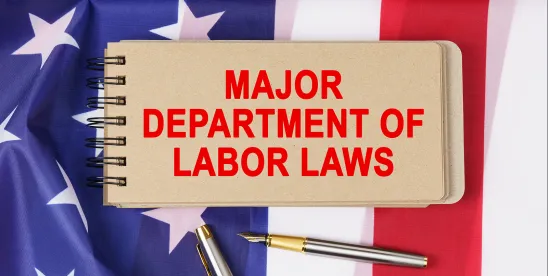On July 24, 2025, the U.S. Department of Labor’s (DOL) Wage and Hour Division (WHD) announced it would once again oversee the Payroll Audit Independent Determination (PAID) program, allowing employers to self-report violations of the Fair Labor Standards Act (FLSA) and Family and Medical Leave Act (FMLA). Without such supervision, an employee cannot be made to waive his or her rights to pursue a private lawsuit against an employer for lost wages.
In addition, the DOL launched several other new self-audit programs and expanded others relating to the Employee Retirement Income Security Act (ERISA), the Mine Safety and Health Act, the Occupational Safety and Health (OSH) Act, the Labor-Management Reporting and Disclosure Act, and the Uniformed Services Employment and Reemployment Rights Act (USERRA).
Quick Hits
- WHD’s PAID program allows employers to self-audit their pay and leave practices under the FLSA and FMLA.
- An employer that discovers a violation can self-report the violation to WHD.
- WHD will then review the audit and has the discretion to determine whether it desires to work with the employer to correct its mistakes.
- Employees will receive 100 percent of their back wages (or other remedies) but no liquidated damages (generally an equal amount of the back wages owed).
- Because the PAID program provides a supervised settlement, the employer receives a release of liability.
The PAID program was first introduced during President Donald Trump’s first term and abandoned during the Biden administration. On July 24, 2025, the DOL announced it was (re)launching the PAID program, among others. Notably, almost month earlier, on June 27, 2025, WHD issued Field Assistance Bulletin No. 2025-3, announcing that WHD would “no longer request liquidated damages in any pre-litigation investigation or resolution” under the FLSA. Together, these developments present employers with an option to reduce liability pre-litigation by resolving alleged overtime and minimum wage violations without liquidated damages.
Eligibility to Use the PAID Program
First, an employer must be covered under the FLSA and/or the FMLA to use the PAID program. The FLSA applies to employers with two or more employees (or an employee who is covered) and, most often used as the second factor, a company whose annual dollar volume of sales or receipts is more than $500,000. In order to be covered under the FMLA, generally, an employer must employ fifty or more employees in twenty or more workweeks in the current or previous calendar year (there are other ways to be covered).
Second, the employer must want to participate in the PAID program by proactively resolving the potential issues, whether they be due to misclassification, overtime, minimum wage, tips, or FMLA claims. When the employer contacts WHD concerning a proposed PAID self-audit, it will generally need to certify to numerous attestations, including:
- The employer is covered under the FLSA or FMLA (whichever applies to the audit).
- The employees are not subject to various prevailing wage requirements, such as those under the H-1B or H-2A visa programs, Davis-Bacon Act, or Service Contract Act.
- There have been no findings in the past three years by WHD or a court that the employer violated the FLSA or FMLA.
- The employer is not currently a party to litigation (private, WHD, or state) asserting that the compensation or leave practices at issue in the self-audit violate the FLSA or FMLA.
- There is no ongoing investigation by WHD to the employer’s knowledge.
- WHD has been informed of all recent employee complaints (or their representatives).
- The employer has not participated in the PAID program within the past three years related to FLSA or FMLA violations.
- The employer acknowledges its continuing duty to update WHD regarding any changes to the information provided.
- In the case of an FLSA audit, the employer acknowledges that participation does not cut off employee rights under other state or local laws.
- In the case of an FMLA audit, the employer acknowledges that participation does not cut off employee rights under other federal laws such as the Americans with Disabilities Act, the Pregnant Workers Fairness Act, Title VII of the Civil Rights Act of 1964, or state or local laws.
Last, the employer must be willing to commit to future compliance.
In addition to the above attestations, employers wishing to use the PAID program will also need to review several compliance assistance materials (including short videos) explaining both the program and the relevant law (FLSA or FMLA).
Working Through the Audit Process to Resolution
The last step in the submission process is to conduct the audit and identify the potential violations, the employees affected in the past two years, the timeframe in which each employee was affected, and the calculation of back wages owed or specification of other FMLA remedies necessary to be in compliance.
Importantly, employers that make back wage payments (or provide remedies available under the FMLA) to their employees prior to submission with the PAID program (and before working through the resolution with WHD) will not be able to benefit from the supervised settlement (and a waiver of the employees’ rights). Rather, employers may want to contact the WHD district office and provide it with the names, addresses, and phone numbers of affected employees, back wage calculations with supporting evidence and methodology (or other FMLA remedies), payroll, and other relevant records, evidence showing the practice has been corrected, an explanation of the scope of potential violations, and certification that the program information and compliance assistance materials have been reviewed and that the business meets all eligibility requirements.
Following the above, WHD will then evaluate the submission and contact the employer to discuss next steps, including whether the employer is accepted into the PAID program. At that time, the employer will be provided with the proposed scope of the release of liability. Finally, WHD will issue its summary of unpaid wages (WH-56) and forms for the employees to sign (WH-58) waiving their rights. Employees may choose to accept/decline payment (or FMLA remedies). The employer will be responsible for issuing prompt payment (or implementing the FMLA remedies) within fifteen days of receiving the WH-58.
Key Takeaways
Using the PAID program may not be for every employer. Employers that qualify may want to consider state law claim/exposure, as well as the fact that WHD has complete discretion whether to accept an employer’s self-audit. As noted above, WHD is no longer enforcing liquidated damages under the FLSA, so whether the employer audits and corrects FLSA issues on its own, is part of the supervised PAID program, or is under investigation, WHD is not assessing liquidated damages except in litigation.
Thus, employers may want to consider whether the time, burden, and formality associated with participation in the program is beneficial for the waiver and release of wage claims—especially where a state or local law may still provide those employee rights. Also, employers may want to consider that they can use the PAID program only once every three years; if the issue is not significant, employers may want to consider handling smaller issues on their own and using the PAID program for more significant matters. Further, even with the PAID program, an employee may choose to decline payment and litigate the wage matter directly.




 />i
/>i


